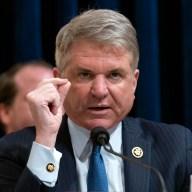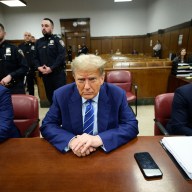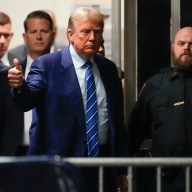 Zhang Ziyi is seen in one of the many beautiful images in “The Grandmaster.”
Zhang Ziyi is seen in one of the many beautiful images in “The Grandmaster.”
Credit: The Weinstein Company
The martial arts legend and teacher Ip Man has birthed a veritable cottage industry of recent biopics that have pounced on every last second of his life — or at least his myth. This year alone already boasts “Ip Man: The Final Fight.” Because of that, the one made by expressionistic filmmaker Wong Kar-wai (“In the Mood for Love”) is free to do what it wants. It does and it doesn’t. Make no mistake: This is a film by Wong Kar-wai — that is, moody, free-form, more about interior life than action, albeit with just enough ass-kicking to get by.
Wong — making his first feature since 2007’s rickety “My Blueberry Nights,” starring Norah Jones — would seem an odd man to handle kung fu fighting. But he finds a middle ground. The scenes where Ip (Tony Leung) takes on foes exist precisely on the line separating smackdowns and grace. The tussles make coherent sense, but just barely. Every kick or hit is felt, and hard, but each blow comes punctuated with a sensuous slow-motion close-up — hands precisely, elegantly making contact, or rain drops flying from spinning bodies.
For the first half, the story is oddly coherent for Wong, too. He’s a filmmaker who often gets lost in his own films, losing the bigger picture to details, rituals and asides. It’s odd seeing him trace Ip’s rise from a nobody who’s been secretly practicing the Wing Chung style for years to his first brush with fame.
The Wong of old rallies in the second, which shifts to Ip’s relationship with Gong Er (Zhang Ziyi), the headstrong (and entirely invented) daughter of a martial arts master. The two never consummate their passions, but passions do bloom. The duels in “The Grandmaster” are closer to dance, but the one between Ip and Gong is like hot sex. They seem to float as they pummel each other on a staircase, their noses almost touching as they spin past each other.
The version of “The Grandmaster” shown in America has been shorn of 20 minutes, by the infamous Harvey “Scissorhands” Weinstein, albeit with Wong’s aid. There’s slightly more action in this cut, and the last act is radically restructured to placate martial arts nerds. This kind of makes sense: The Hong Kong/Chinese cut becomes increasingly melancholic, mourning Ip’s transition from promising man of action to teacher. (The American version dwells on a young pupil, who is implied to be Ip’s most storied protege, Bruce Lee.) Attempts to punch up the ending make for some structural incoherence, especially since Gong eventually becomes more of a presence than Ip. In either cut, the film is imperfect — but no one does imperfect like Wong.














